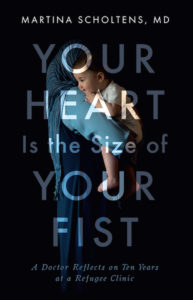November 27, 2017
Your Heart is the Size of a Fist, by Martina Scholtens
 After a few days stuck in a reading rut, I knew I was probably going to enjoy Your Heart is the Size of a Fist, by Martina Scholtens MD. I’d flipped through it and supposed this was a collection of vignettes about a doctor’s experience working with patients at a Vancouver refugee clinic, a timely topic with the arrival of thousands of Syrian refugees in Canada over the last two years, and considering that our previous Federal government had seen fit to cut refugee healthcare—a decision that was reversed when the Liberal government restored benefits in 2016. A few passages jumped out at me—there was a bit about Canadian sponsors and infantilization of the refugee families they’d supported, which is something I’ve been thinking about a lot, the complexity of those relationships. This would be a book I’d find interesting, I knew.
After a few days stuck in a reading rut, I knew I was probably going to enjoy Your Heart is the Size of a Fist, by Martina Scholtens MD. I’d flipped through it and supposed this was a collection of vignettes about a doctor’s experience working with patients at a Vancouver refugee clinic, a timely topic with the arrival of thousands of Syrian refugees in Canada over the last two years, and considering that our previous Federal government had seen fit to cut refugee healthcare—a decision that was reversed when the Liberal government restored benefits in 2016. A few passages jumped out at me—there was a bit about Canadian sponsors and infantilization of the refugee families they’d supported, which is something I’ve been thinking about a lot, the complexity of those relationships. This would be a book I’d find interesting, I knew.
What I was not anticipating was that I’d be so compelled by the work as literature, for its shape as a memoir, the glimmer of its prose, and for its depth and richness as memoir. These are not just stories of Scholtens’ patients, the story of her work, its challenges and contradiction, its joys and satisfactions. The book is framed by Scholtens’ engagement with a family newly arrived from Iraq (although, as she writes in her preface, her patients in the book are composites of actual people for privacy concerns) and also by her own family life as she suffers a miscarriage and then later becomes pregnant again, giving birth to her fourth child. She counsels the Haddad family through their health concerns (PTSD among them), works to diagnose their son’s developmental problems, talks to their teenage daughter about sexual health, and gives the girl’s mother advice about how to get pregnant all the while being wary of the many health risks involved. Along with this family, we are shown glimpses into Scholtens’ relationships with other patients, from Kenya, Myanmar, Syria and Iraq.
It is with Scholtens’ own pregnancy loss and the profound way in which her own healthcare provider is present for her that she has a revelation about the role she plays in her patients’ lives. Previously, she’d felt uncomfortable with their profound gratitude toward her when she felt as though she wasn’t really providing anything, or certainly only providing to piecemeal solutions to the problems they were working to overcome in their lives. But she comes to understand the value of a physician just to bear witness and listen. She comes to understand too that while the gifts her patients bring for her, for example, might make her uncomfortable, her patients are seeking to balance a relationship in which they feel profoundly indebted. Or else gift-giving is an important cultural touchstone for that particular patient—and there funny and lovely anecdotes depicting these interactions.
Bearing witness is no small thing though, and Scholtens writes beautifully about her own struggles. What does it do to one’s spirituality and notions of God and good and evil, to see evidence of the harm and trauma that people can inflict on others? How does she reconcile her own comfortable life in contrast to the poverty and social isolation of the people she cares for? How to balance the demands of her job with her own mental health and general wellbeing—not to mention the demands of caring for four children? How to bridge cultural gaps without undermining the essential nature of cultural identity and religion?
Your Heart is the Size of Your Fist becomes a story of how a doctor learns from her patients the answers to all these questions, or at least discerns clues as to the direction to go in search of answers. To say that it’s an uplifting and breezy read should not undermine the spiritual weight of Scholtens’ story and its importance—but hopefully it will compel you to read it.






Kerry, what a gorgeous review. I’m so glad that you enjoyed it.